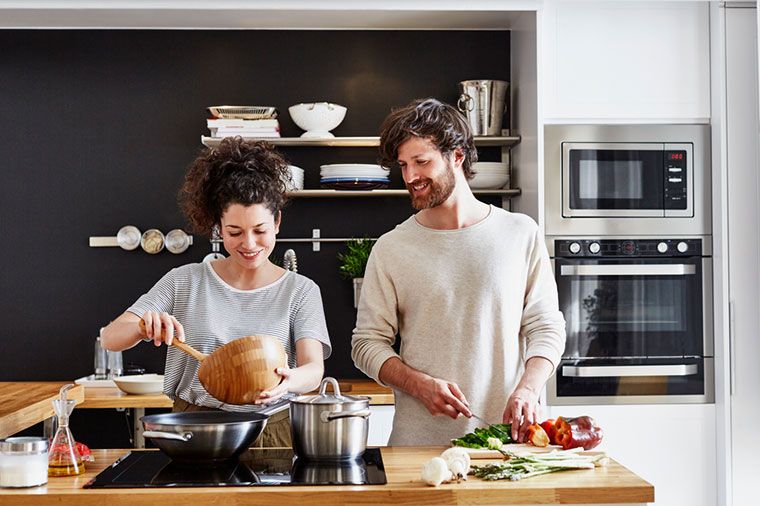What to Do If You’re the Healthy Person in the Relationship
You're grocery shopping with your partner, eyeing the nutrition label of some lentil pasta when you realize he has vanished—to the cookie aisle.
It's a common scenario: One person in the relationship is a wellness aficionado who can rattle off the latest fitness hacks and nutritional studies, while the other doesn't care about inflammatory foods or fitting in a regular sweat sesh (if any at all).
No biggie, right? Well, maybe—according to one relationship pro, it's an issue that can lead to a deep rift between a couple if things aren't handled correctly. "If you’re chronically the healthier person in a relationship that goes on for a long time, it could be a sign this isn't a healthy relationship," says Jill Weber, PhD, clinical psychologist and author of Having Sex, Wanting Intimacy.
"The best part of intimacy is this back-and-forth connection, and there should be three parts acceptance to one part asking them to change."
Of course, you can't just tell a S.O. who's all about hygge (but HIIT, not so much) to drop the junk food and get to the gym. (As Dr. Weber puts it, "It's hard to motivate people if they're not motivated themselves.") Relationships are about compromise, after all.
"Love is always a pull-push where you're trying to grow as an individual and as a couple, while accepting each other as you are," says Dr. Weber. "It sounds contradictory, but if there's a lot of acceptance with the push to grow, it's a really good formula. The best part of intimacy is this back-and-forth connection, and there should be three parts acceptance to one part asking them to change."
She notes that if the ratio flips to three parts change, one part acceptance, it can get a little overwhelming—and painful—for the person on the receiving end, which puts a strain on the relationship. And there's nothing healthy about that.

{{post.sponsorText}}
Need help navigating a relationship where you're the more wellness-obsessed one? Keep reading for Dr. Weber's advice.

Don't try to direct things
Although you may have the urge to tell your partner the healthy habits he or she should adopt, the best way to accomplish this is through gentle encouragement. "You don't have to control what they're doing; they can come up with their own ideas," says Dr. Weber. "Talk to them about what their goals are—they don't have to be the same as yours."
Of course, goals and action don't always overlap—and if your partner wants to get into shape, it can be frustrating to see them continue to sit around and not do anything about it. "It doesn't help to say, 'Why don't you go for a run right now?'" says Dr. Weber. "You can say something like, 'I can tell it bothers you, you've talked about wanting to get fit, so have you made any goals around that?' Just ask the question without any expectations or accusatory tone, and you'll get a better, more honest answer."

Let your judgmental mind take a breather
Sometimes you can become too fixated on your partner's shortcomings. "It's easy, when you have your own issues, to instead focus on your partner's issues," say Dr. Weber. (Guilty as charged.) "People tend to hyper-fixate on something, but part of being in a relationship is acceptance—no matter who you're with, there are going to be some things that aren't exactly what you want."
The problem with obsessing over another person's faults is that it can lead them to rebel. "They'll think that they can't be themselves with you," she says. "No one wants to lose their identity in a relationship."

Meet in the middle on meals
It may be too much of a dream to ask your partner to sip on chlorophyll or eat spirulina on the reg—but you can make concessions (that are still healthy!) when it comes to what you're cooking. "When you have different health or diet needs, planning meals is a great way to work on compromising as a couple," says Dr. Weber. "Try to have a direct, mature conversation, and be willing to give in on something so the other person doesn't feel like the meal only represents the kinds of foods you like."
For example, if your partner really likes rich foods, be willing to go there once in a while—but ask if you can make it dairy-free, for example. "Recognize their wants, but add your own stipulations to make it a win-win for both of you," says Dr. Weber. "It's good to start with validating what they like before trying to control it."

Find the fun in fitness
Let's say your partner isn't into the boot camp-style workouts you prefer, or just isn't comfortable in gyms. This is also an area where you can compromise while still getting the endorphin boost you crave. "Make it like an adventure," says Dr. Weber. "It's not about having them exercise with you all of the time and doing exactly what you do, but get them to give you an hour to do something fun that also gets you sweating."
Brainstorm activities you can do together—maybe you'll realize you'd both like to hike, or go ice skating or rollerblading. "Being a couple opens up other ways to be physically active," she says. Who knows, you just might find yourself a new hiking partner. Or maybe they'll discover a newfound obsession—their (sweaty) version of your spin class addiction.
If you've been together for a long time, sometimes things lose steam—here's how to bring the excitement back into a long-term relationship. And if you're not feeling frisky these days, here are five causes of low sex drive (and how to deal with it).
Loading More Posts...